With a presence as commanding as a regal lion, the Doberman Pinscher stands tall among the canine kingdom. This breed, originating from Germany, possesses a striking appearance, unparalleled intelligence, and unwavering loyalty.
As one delves into the world of Doberman Pinschers, they will uncover a wealth of information and characteristics that make these dogs truly unique. From their physical attributes to their training needs and suitability as pets, there is much to explore and discover.
So, whether you are a seasoned Doberman enthusiast or simply curious about this remarkable breed, prepare to embark on a journey that will leave you captivated and eager for more.
Key Takeaways
- Doberman Pinschers are medium to large-sized dogs that originated from Germany and are well-suited for working roles like police and guard dogs.
- Early training and socialization are important for Dobermans to prevent behavioral issues and cultivate their intelligence and well-rounded temperament.
- Prioritizing adoption from rescue organizations or shelters is recommended, as it saves a life and is often more cost-effective than purchasing from a breeder.
- Dobermans have a rich history as loyal, intelligent, and protective dogs, but they are prone to genetic health issues such as dilated cardiomyopathy and hip dysplasia, which can be prevented through regular screenings and maintaining a healthy lifestyle.
Origin and Size
The Doberman Pinscher, originating from Germany, is a medium to large-sized breed weighing between 60 to 100 pounds (27 to 45 kilograms). Known for their sleek and muscular appearance, Dobermans possess a strong and elegant physique. With a height ranging from 24 to 28 inches (61 to 71 centimeters) at the shoulder, they've a well-proportioned body that exudes power and grace.
Their size and strength make them well-suited for various working roles, including police and guard dog duties. Despite their imposing stature, Dobermans are agile and athletic, capable of quick movements and impressive speed.
Their size, coupled with their intelligence and loyalty, makes them an excellent choice for families seeking a versatile companion and protector.
Training and Socialization
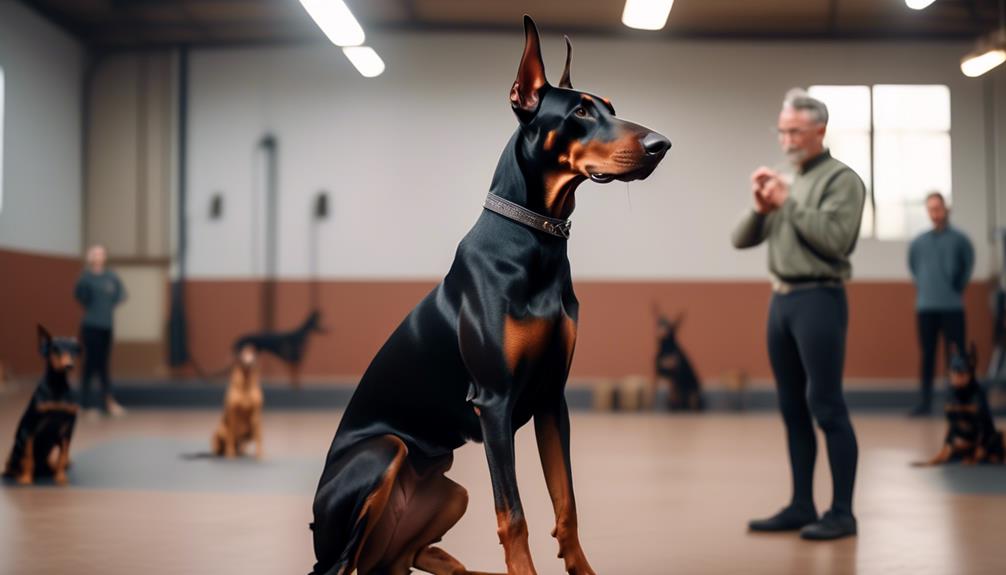
After discussing the origin and size of the Doberman Pinscher, it's crucial to now focus on their training and socialization in order to cultivate their intelligence and ensure a well-rounded temperament.
Training and socialization should begin early with Dobermans, as they're highly intelligent but can also be stubborn. It's important to introduce them to new people and animals early on to prevent any potential behavioral issues.
Consistent and positive training methods work well with this breed, helping to establish good manners and obedience. Regular exercise and mental stimulation are also necessary for Dobermans to prevent boredom and destructive behaviors.
Choosing a Doberman
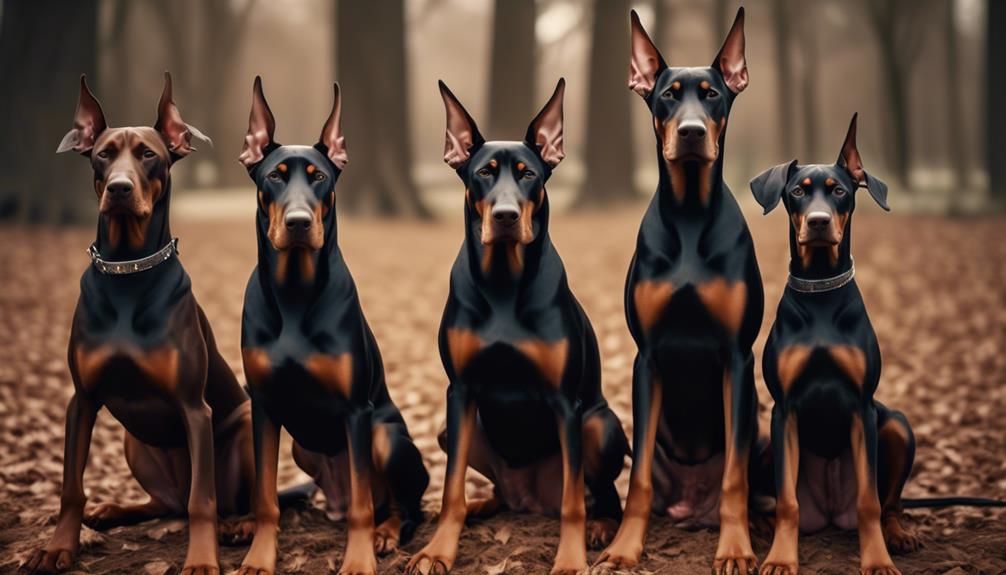
When choosing a Doberman, it's important to prioritize adopting from rescue organizations or shelters to give these dogs a second chance at a loving home.
While purchasing from a reputable breeder is also an option, adopting a Doberman from a rescue organization or shelter not only saves a life but also provides a loving home for a dog in need.
These organizations carefully assess the temperament and health of the dogs before placing them for adoption, ensuring that they're suitable for their new families.
Additionally, adopting from a rescue organization or shelter is often more cost-effective than purchasing from a breeder.
Doberman Facts and Popularity
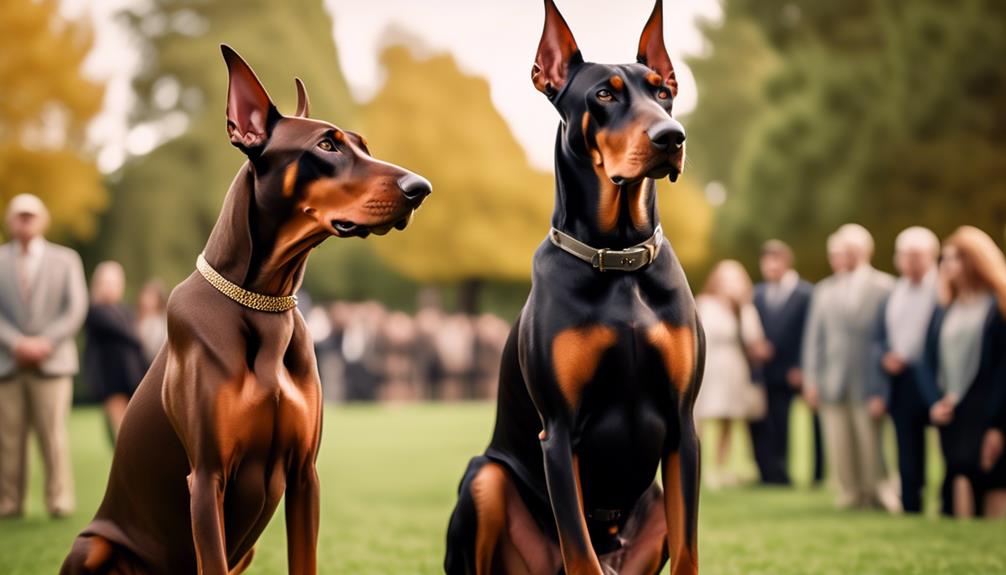
Continuing the exploration of Doberman Pinschers, let's now delve into the fascinating world of Doberman facts and their popularity.
Dobermans have a rich history as guard and police dogs, making them well-known for their loyalty, intelligence, and protectiveness. They were also utilized in both World War I and II, further showcasing their versatility and usefulness.
However, it's important to note that Dobermans are prone to certain genetic health issues, such as dilated cardiomyopathy and hip dysplasia. Despite these potential health concerns, Dobermans remain a popular breed, often featured in movies and owned by celebrities.
Their striking appearance and impressive abilities continue to captivate dog enthusiasts worldwide. It's crucial for potential owners to be aware of these facts and consider the breed's unique needs before bringing a Doberman into their homes.
Adaptability of Dobermans
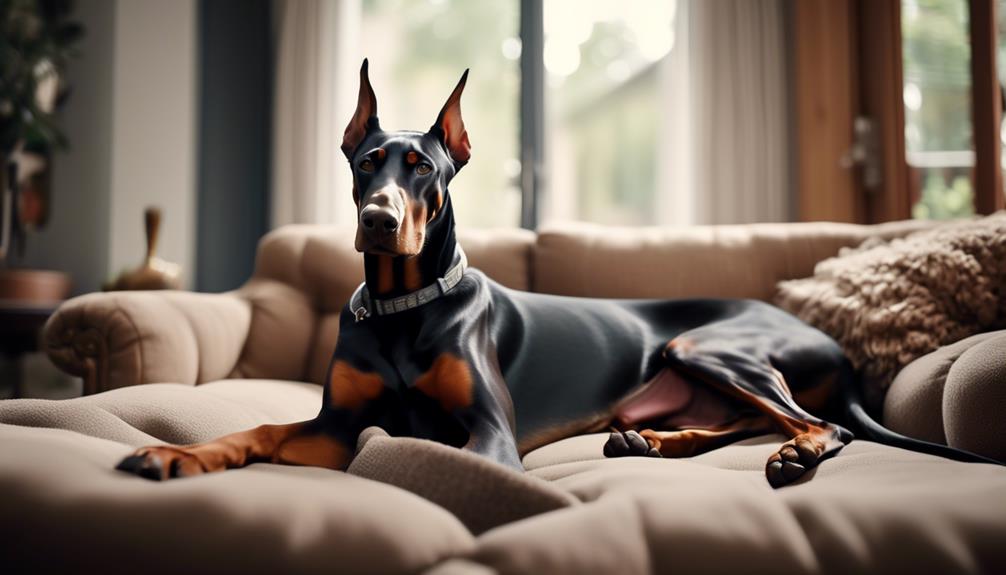
The adaptability of Doberman Pinschers makes them well-suited for various living situations, including apartment living. Despite their size, Dobermans can thrive in smaller spaces as long as their energy levels and behavior towards neighbors are taken into consideration. Here are five factors to consider when assessing their adaptability:
- Energy levels: Some Dobermans have lower energy levels and are more suited to apartment living. However, it's important to note that individual energy levels can vary within the breed.
- Behavior towards neighbors: Dobermans that are quiet, well-mannered, and have a calm disposition are more suitable for apartment living, as they're less likely to disturb neighbors.
- Interaction with other dogs: Some small dog breeds can thrive in apartments, and if your Doberman gets along well with other dogs, this can also make apartment living easier.
- Exercise requirements: Despite living in an apartment, Dobermans still require regular exercise to maintain their physical and mental well-being. Ensuring they have access to suitable exercise opportunities is crucial.
- Training and socialization: Proper training and early socialization are important for Dobermans to adapt well to any living situation, including apartments. Consistent and positive training methods can help them become well-behaved and obedient companions.
Health Issues and Considerations
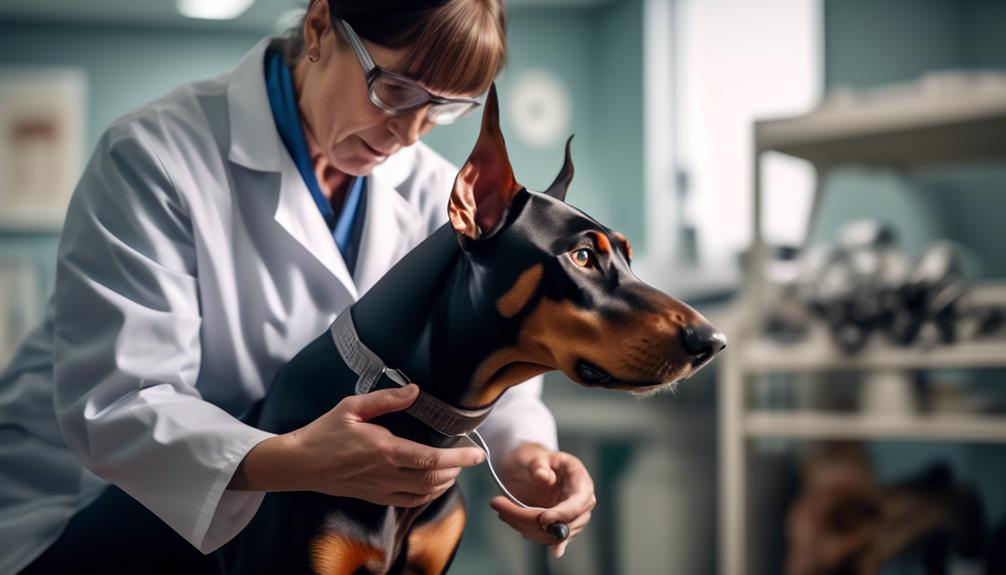
After discussing the adaptability of Doberman Pinschers in various living situations, such as apartment living, it is important to address the health issues and considerations associated with this breed. Dobermans are generally a healthy breed, but like any other breed, they can be prone to certain genetic health issues. It is crucial for potential owners to be aware of these issues and take necessary precautions. The table below provides an overview of some common health issues that Dobermans may face:
| Health Issue | Description | Prevention |
|---|---|---|
| Dilated Cardiomyopathy (DCM) | A heart disease that affects the heart's ability to pump blood efficiently. | Regular cardiac screenings and a heart-healthy diet. |
| Von Willebrand's Disease | A blood clotting disorder. | Genetic testing before breeding and regular blood screenings. |
| Hip Dysplasia | A condition where the hip joint doesn't fit properly, leading to pain and mobility issues. | Regular exercise, maintaining a healthy weight, and breeding from healthy parents. |
Frequently Asked Questions
Are Doberman Pinschers Good With Children?
Doberman Pinschers are generally good with children, but proper socialization and training are important. They are loyal and protective by nature, making them potential great companions for kids.
How Much Exercise Do Doberman Pinschers Need?
Doberman Pinschers need a significant amount of exercise to keep them physically and mentally stimulated. They thrive with daily walks, runs, and playtime. Regular exercise helps prevent boredom and behavioral issues.
Can Doberman Pinschers Be Left Alone for Long Periods of Time?
Yes, Doberman Pinschers can be left alone for long periods of time, but it's not recommended. They are highly social dogs and may become anxious or develop behavior problems if left alone for extended periods.
Do Doberman Pinschers Shed a Lot?
Yes, Doberman Pinschers do shed, but not excessively. Their short, smooth coat requires regular brushing to minimize shedding. Proper grooming and a healthy diet can help maintain their coat and reduce shedding.
Are Doberman Pinschers Prone to Separation Anxiety?
Doberman Pinschers can be prone to separation anxiety. They form strong bonds with their owners and may become distressed when left alone for long periods. Proper training and gradual desensitization can help alleviate this issue.
– How Does the Fox Terrier Compare to the Doberman Pinscher in terms of Characteristics and Traits?
The fox terrier dog characteristics include high energy, intelligence, and a playful nature. On the other hand, the Doberman Pinscher is known for its loyalty, strength, and protective instincts. While the fox terrier is a smaller, sprightly breed, the Doberman is larger and more serious in demeanor.
Conclusion
In conclusion, the Doberman Pinscher is a remarkable breed known for its striking appearance, intelligence, and loyalty. With proper training, socialization, and care, these dogs can make wonderful companions.
Whether adopting from a rescue organization or purchasing from a reputable breeder, it's important to prioritize the health and temperament of the dog. The Doberman's adaptability to different living situations and its popularity as a pet further highlight its appeal.
However, potential owners should also be aware of the breed's genetic health issues and take necessary precautions.




